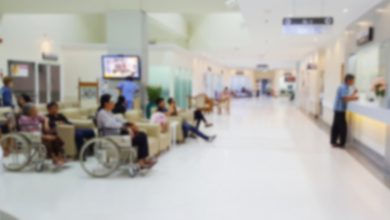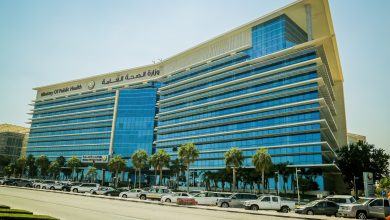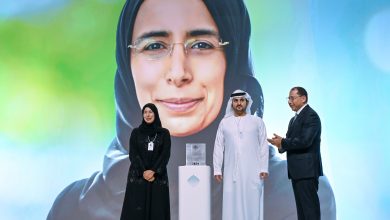HMC: Majority of Liver Patients Can Fast during Ramadan under Certain Conditions
حمد الطبية تؤكد أن غالبية مرضى الكبد يمكنهم صيام رمضان ولكن بشروط
QNA
Doha: Dr. Mootaz Derbala, Sr. consultant of Gastroenterology and Hepatic diseases at Hamad Medical Corporation, stated that the majority of liver patients with stable conditions can fast during the month of Ramadan without possible complications. However, patients with acute hepatitis, Esophageal varicose, and ascites and Hepatic Encephalopathy (Coma), should refrain from fasting.
Dr. Derbala told Qatar News Agency (QNA) that those with severe liver diseases, such as acute viral hepatitis of types (A, B, and C) cannot fast. However, those with stable chronic conditions such as hepatitis, liver dysfunction, or people with fatty-liver disease, can fast, in this case, may rid such patients of excess liver fat.
Dr. Mootaz Derbala added that late-stage liver disease patients with conditions such as varicose veins, ascites, Hepatic Encephalopathy (Coma), and comorbidities such as diabetes should refrain from fasting from a medical viewpoint. Patients with liver immunodeficiency, congenital liver disease, Hepatitis B, and Hepatitis C, may fast after consulting their attending physician.
Liver patients who intend to fast during the month of Ramadan should adhere to healthy dietary practices. It is important to choose foods that do not harm the health of the liver patient, advising those fasting to break their fast with a light sweet drink, have a prayer break, and then take their iftar meal, he explained.
The iftar meal should comprise of carbohydrates, fruit sugars, and proteins with minimal quantities of fat, especially for fatty-liver patients and adequate amounts of fluids to prevent dehydration. To achieve optimal function of the liver, liver patients should have a balanced diet inclusive of all food groups; cereals, fruits, vegetables, meat, beans, milk, and oil, in addition to fiber-rich foods such as wholegrain bread, rice, fruits, and vegetables, he added.
Regarding patients who underwent a liver transplant, Dr. Derbala said these patients should refrain from fasting within the first year of such transplant. After completing a year, patients may fast during the month of Ramadan upon consulting their physician, who would ensure the proper function of the transplanted liver.
For those with liver disease, fasting can regulate the doses of his medications, and for those who are treated with tablets, they can take the doses at iftar and suhoor. For liver transplant patients who are allowed to fast according to the conditions described, they take medicines that stabilize the transplanted liver at breakfast and suhoor, Dr. Derbala said.
Liver and liver transplant patients who intend to fast during the month of Ramadan should rearrange immunosuppressant and oral medications’ timings whereby they take them at Iftar and Suhoor time, he added.
Patients on diuretic drugs or Esophageal varicose medications cannot fast during the month of Ramadan for health reasons as the time for taking medications cannot be rearranged and medications cannot be stopped. Liver patients with other associated diseases such as pressure, diabetes, or asthma need to consult a doctor to organize their medication use during Ramadan, he said.
Patients with unstable liver disease may encounter health problems during their fast. Signs of these health problems include dizziness and paleness of the skin. Should these signs appear, patients are advised to break their fast, he highlighted.
He said that smoking causes other diseases in addition to their liver disease; therefore, can adversely interfere with liver disease medications. Fasting is a favorable opportunity to stop and quit smoking, Dr. Derbala said.
قنا
الدوحة: أكد الدكتور معتز دربالة، استشاري أول الجهاز الهضمي وأمراض الكبد بمؤسسة حمد الطبية، أن غالبية مرضى الكبد من ذوي الحالات المستقرة يستطيعون صيام رمضان من دون مضاعفات محتملة، لكنه شدد على أن بعض الحالات التي يتعين على المريض فيها عدم الصوم تتمثل في مرضى الالتهاب الكبدي الفيروسي الحاد، ومرضى دوالي المريء، والاستسقاء، والغيبوبة الكبدية.
وحول تصنيف مرضى الكبد بالنسبة للصوم، قال الدكتور دربالة لوكالة الأنباء القطرية /قنا/ إن هناك حالات مرضية حادة، مثل الالتهاب الكبدي الفيروسي الحاد من الأنواع (أ، ب، ج)، فهؤلاء يمتنع عليهم الصوم.
أما بالنسبة للحالات المزمنة المستقرة مثل حالات الفيروس أو الالتهاب الكبدي أو الخلل في وظائف الكبد أو المصابين بدهون على الكبد، فهؤلاء المرضى يمكنهم الصوم، وربما كان الصوم مفيدا لهم، حيث يفيد بحرق هذه الدهون.
وأضاف الدكتور معتز دربالة أن أصحاب الحالات المزمنة لكن في درجات متأخرة من المرض مثل مرضى دوالي المريء والاستسقاء، والغيبوبة الكبدية، ومرضى الكبد المزمن المصحوب بمرض السكري فهؤلاء يستحب لهم الإفطار من الناحية الطبية، كما أن مرضى الخلل المناعي للكبد وأمراض الكبد الوراثية وأمراض كبدية منذ الطفولة ومصابي فيروس الكبد (ب، ج) فهؤلاء يمكنهم الصوم ولكن بعد استشارة الطبيب المعالج أولا.
وأشار إلى أهمية اتباع العادات الغذائية السليمة لمريض الكبد في رمضان، حيث من المهم اختيار نوعية الأطعمة التي لا تضر بصحة مريض الكبد، ولعل رمضان فرصة لتنظيم مواعيد الغذاء والوجبات، لذا ينصح المريض الصائم أن يبدأ فطوره بمشروب سكري خفيف، وأخذ فترة قصيرة من الراحة لصلاة المغرب، ثم العودة إلى تناول الفطور.
ونصح بأن تشتمل الوجبة على النشويات والسكريات والبروتينات، وتقل بها كمية الدهون للحد الأدنى، خاصة لمرضى الدهون على الكبد، كما يفضل أن تحتوي الوجبة على الفواكه لتمده بالسكريات مع شرب السوائل، والابتعاد عن الكثير من الأطعمة المقلية، بما في ذلك الوجبات السريعة والمحار غير المطبوخ، ويتعين لمريض الكبد أن يتناول نظاما غذائيا متوازنا يضم جميع المجموعات الغذائية كالحبوب والفواكه والخضروات واللحوم والفاصوليا والحليب والزيت، وتناول الطعام الذي يحتوي على الألياف؛ لأنها تساعد الكبد على العمل على المستوى الأمثل، فيمكن للفواكه والخضراوات وخبز الحبوب الكاملة والأرز والحبوب أن تعتني باحتياجات الجسم من الألياف، وبالإضافة لذلك يجب شرب الكثير من الماء حيث يمنع الجفاف، ويساعد الكبد على العمل بشكل أفضل.
وعن صوم المرضى الذين أجريت لهم عملية زراعة كبد يوضح الدكتور دربالة أن هؤلاء المرضى لهم خصوصية، فخلال السنة الأولى بعد إتمام زراعة الكبد لا يمكنهم الصوم لأسباب طبية، أما بعد مرور السنة الأولى فعلى المريض مراجعة طبيبه قبل الصوم للتأكد من حالة الكبد المزروع، فالصوم مقبول بعد مرور سنة على الزراعة بشرط مراجعة الطبيب المعالج أولا.
ويمكن لمريض الكبد الصائم تنظيم جرعات أدويته، وبالنسبة للمرضى الذين يعالجون بالأقراص يمكنهم تناول الجرعات عند الإفطار والسحور، وبالنسبة لمرضى زرع الكبد الذين يسمح لهم بالصوم حسب الشروط الموضحة، فيتناولون الأدوية المثبتة للكبد المزروع عند الإفطار والسحور.
أما المرضى الذين يتناولون أدوية مدرة للبول أو أدوية لعلاج دوالي المريء، أوضح الدكتور دربالة أن هناك قاعدة طبية تقول إن هؤلاء لا يمكنهم الصوم، حيث لا يمكن إعادة توزيع وقت تناول الأدوية، ولا يمكن منع الأدوية عنهم، كما أن مرضى الكبد المصابين بأمراض أخرى مصاحبة مثل الضغط أو السكري أو الربو فهؤلاء يحتاجون لمراجعة الطبيب؛ من أجل تنظيم مواعيد تعاطي الأدوية في رمضان.
وعن الحالات الطارئة التي يمكن أن تواجه مريض الكبد أثناء صومه، يشير إلى أنه إذا كانت حالة مريض الكبد مستقرة وغير متقدمة فلن يواجه متاعب أثناء الصوم، وهناك المتاعب الشائعة لدى بعض المرضى، فهي تبدأ بالدوخة، ومن ثم قد يظهر الاصفرار على المريض، وهنا ينصح المريض بالإفطار.
أما المدخنون من مرضى الكبد فأكد أن التدخين يسبب الإصابة بأمراض أخرى تضاف إلى مرضهم بالكبد، وبالتالي فقد تمنع تلك الأمراض الناشئة عن التدخين المريض من تناول أدوية مهمة لعلاج الكبد، ويبقى أن الصوم فرصة مواتية للتوقف والامتناع عن التدخين مدى الحياة.




